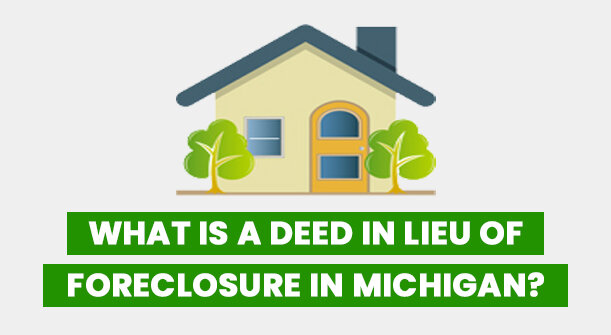
Foreclosure is a distressing situation that many homeowners in Michigan may face if they are unable to keep up with their mortgage payments. The foreclosure process can have severe consequences, such as losing your home and damaging your credit score. However, there is an alternative to foreclosure known as a deed in lieu.
How Does Foreclosure Work in Michigan?
Foreclosure is a legal process in which a mortgage lender takes possession of a property due to the homeowner’s failure to make timely mortgage payments. In Michigan, the foreclosure process typically involves several steps.
- The lender files a complaint with the court, initiating the foreclosure proceeding.
- The homeowner then receives a notice of foreclosure, giving them an opportunity to catch up on missed payments.
- If the homeowner fails to do so, a judgment of foreclosure is issued, and the property is scheduled for sale at a public auction.
Foreclosure can occur due to various circumstances, such as financial hardship, job loss, or a significant increase in mortgage payments due to an adjustable interest rate.
The impact of foreclosure on homeowners is devastating, as they lose their homes and may face difficulty in finding alternative housing. Lenders also suffer financial losses due to the lengthy legal process and the potential for the property to sell for less than the outstanding mortgage debt.
What Is a Deed in Lieu of Foreclosure?
A deed in lieu of foreclosure is an alternative to the traditional foreclosure process. It involves the homeowner voluntarily transferring the property’s ownership to the lender to satisfy the mortgage debt. The homeowner gives up their rights to the property, and the lender agrees to release them from the mortgage obligation.
To initiate a deed in lieu of foreclosure, the homeowner must approach the lender and express their willingness to negotiate. The lender will assess the homeowner’s financial situation, including their ability to continue making mortgage payments. If the lender agrees to accept a deed in lieu, the homeowner must provide documentation, such as a hardship letter, financial statements, and proof of property value.
Once all the necessary paperwork is completed, the homeowner transfers the property’s title to the lender, and the foreclosure process is halted.
What Are the Benefits of a Deed in Lieu of Foreclosure?
There are several benefits to pursuing a deed in lieu of foreclosure for both lenders and borrowers.
Benefits of Lenders
For lenders, accepting a deed in lieu can save them time and money. They avoid the lengthy legal process of foreclosure and the associated legal costs. Additionally, they can quickly take possession of the property and avoid the potential complications of dealing with junior liens or judgments.
Benefits for Homeowners
A deed in lieu of foreclosure allows homeowners to avoid foreclosure and the negative impact it has on their credit score.A deed in lieu can also help homeowners avoid the tax implications that may arise from a foreclosure sale. Some lenders may offer incentives, such as a ‘cash for keys’ offer, to encourage homeowners to pursue a deed in lieu.
Drawbacks and Considerations
While a deed in lieu of foreclosure may seem like an attractive option, there are also drawbacks and considerations to keep in mind.
Drawbacks for Homeowners
For homeowners, the primary drawback is the potential tax consequences. In certain situations, the cancellation of debt resulting from a deed in lieu may be treated as taxable income. It is essential to consult with a tax professional to understand the specific implications for your situation.
Drawbacks for Lenders
For lenders, the main limitation is that they are not obligated to accept a deed in lieu. They may prefer to proceed with foreclosure if they believe it will result in a higher recovery of their outstanding mortgage debt. Additionally, lenders may face challenges in cases where there are junior liens or judgments on the property. These complications can prolong the negotiation process and make a deed in lieu less attractive.
There are specific situations where a deed in lieu may not be feasible or advisable. For example, if the homeowner has significant equity in the property or wishes to remain in the home, pursuing alternatives such as a loan modification or refinancing may be more suitable.
How to Negotiate a Deed in Lieu of Foreclosure
Negotiating a deed in lieu of foreclosure requires careful planning and documentation. Here are the steps involved in initiating a deed in lieu negotiation:
- Assess your financial situation and determine if a deed in lieu is the right option for you.
- Contact your mortgage lender and express your interest in pursuing a deed in lieu.
- Prepare a hardship letter explaining your financial difficulties and the reasons for considering a deed in lieu.
- Gather the necessary documentation, such as financial statements, proof of income, and property value.
- Submit the documentation to your lender and wait for their response.
- If the lender agrees to pursue a deed in lieu, work with them to finalize the necessary paperwork and transfer the property’s title.
Alternatives to a Deed in Lieu of Foreclosure
While a deed in lieu of foreclosure can be a viable option for some homeowners, it is essential to consider alternatives as well. Here are a few alternatives to explore:
- Cash home sale: Selling your property for cash can provide a quick solution to get out of a mortgage debt. However, it may not be feasible if you owe more on the mortgage than the property’s value.
- Loan modification: Modifying your existing home loan can lower your monthly payments and make them more affordable. This option is suitable for homeowners who can demonstrate genuine financial hardship.
- Refinancing: Refinancing your mortgage involves replacing your current loan with a new one that has more favorable terms. It can help you secure a lower interest rate and reduce your monthly mortgage payments.
- Short sale: In a short sale, the lender agrees to accept less than the full mortgage balance to facilitate the sale of the property. This option is suitable when the property’s value has decreased, and you owe more on the mortgage than the property is worth.
When choosing the best option, consider factors such as your financial situation, the impact on your credit score, and your long-term goals for homeownership.
We Buy Houses in Detroit, Michigan
If you need to sell your house fast but don’t want the hassle of a traditional home sale, contact M1 Home Buyers. We buy houses as-is. No repairs are needed. Avoid closing costs and realtor commissions. Close in as little as seven days. Call 248-397-5800 to get a fast cash offer from our local home buyers.

